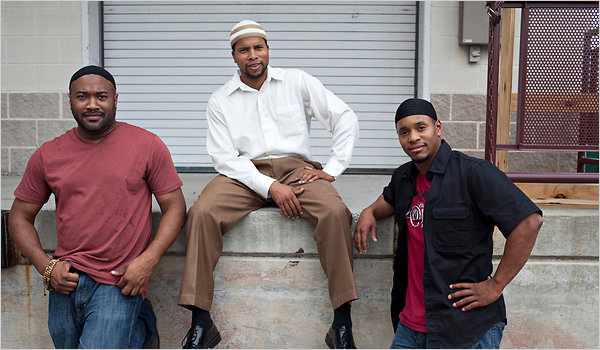Cultural Diplomacy: Islamic Hip Hop from the US

From left, Naeem Muhammad, Joshua Salaam and Abdul-Malik Ahmad form the Islamic hip-hop group Native Deen – Image Credit – Philip Scott Andrews/New York Times.
The New York Times recently ran an article on the band Native Deen, which took a State Department sponsored tour of several countries and recently released their latest album. When they were first asked to participate in the first tour they had qualms:
“We had a debate in the community,” said Abdul-Malik Ahmad, one of the three members of Native Deen. “ ‘Should we do it?’ ‘Should we not do it?’ Some people were saying, ‘Y’all are going to be puppets, going over there saying: ‘Everything’s O.K. We’re bombing your country, but we have Muslims, too!’ ”
They decided to accept the offer and go on a concert tour of Mali, Senegal and Nigeria – and later to Egypt, Tanzania, Jordan and the Palestinian territories. But the article also notes how their work as cultural diplomats entails what they do in US as much as it does tours overseas:
At Native Deen shows, audience members are more likely to be from Middle Eastern or South Asian backgrounds than to be American blacks. One reason, according to Suad Abdul Khabeer, a Purdue University anthropologist who studies Islamic hip-hop, is that Native Deen’s “harmonies and melodies sound like the kind of nasheed” — Muslim praise music — “you get from the Middle East.” As a result, Dr. Abdul Khabeer said, Muslim immigrants who may look down on African-American culture find Native Deen’s work palatable, while American blacks may find it insufficiently aggressive, sonically speaking. “Hip-hop lite doesn’t speak to them in the same way,” Dr. Abdul Khabeer said. “Black audiences are like, ‘That’s kind of lite.’ ” But Native Deen’s faith places it in the history of American hip-hop more generally. Pioneering hip-hop artists like Afrika Bambaataa and Wu-Tang Clan have demonstrated in their lyrics the pervasive influence of Islam in black America. Even when rappers are not themselves Muslim, Dr. Abdul Khabeer said, many borrow ideas and terminology from orthodox Islam and from Muslim-identified groups, like the Nation of Islam and the Five-Percent Nation.
